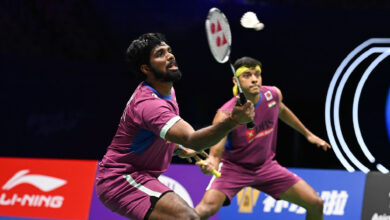World Chess Championship: Of Bob Dylan songs, ordinary supercomputers and dragons fighting bears

After a chastening defeat in Game 2 of the World Chess Championship, China’s Ding Liren managed to hold Russia’s Ian Nepomniachtchi to a morale-boosting draw in Game 3 at Astana on Wednesday.
In sharp contrast to the first two games, the third game saw Ding rooted to his chair on the stage in the playing hall for most part of the afternoon while Nepo flitted in and out of his private lounge.
“I’m getting better and better. You can see I spent more time on the stage today than hiding in the restroom today,” smiled the Chinese GM in his post-match press conference.
From five-time world champion Viswanathan Anand to GM Susan Polgar, there seemed to be a consensus that Ding had managed to stabilise his form and gave a much better account of himself in Game 3. Clearly, whatever he had done on the rest day had worked.
In the press conference Ding was asked what he had done on Tuesday to reset from the debilitating defeat in Game 2.
He said people from his entourage (which includes his parents and his second, Hungarian GM Richárd Rapport) had helped lift up his mood.
“At some point, I thought I had some problem with my mind. In the end, it was not as serious as I expected. My friends talked to me and even asked me if I needed a doctor. But in the end, it was not that serious. It was just pressure before the match,” said Ding, who has been shockingly sincere all through the event.
Ding had said earlier that Rapport and he had bonded over music from the 80s. When asked what music he had heard with his second, he said: “Last one we lened to together was Bob Dylan’s Blowin’ in the Wind.”
Anand, who was doing commentary for FIDE for the third successive game, was asked eight-time US Women’s Champion Irina Krush what his own routine was on rest days.
“The night before the rest day was sacred for me. That was my time to switch off the computer. No work! The night before the rest day was a luxury. For the whole team, that was the time off! They could sleep as late as they wanted, and wake up whenever they wanted. That was the time to let off steam. It was very important for me. Typically, I dract myself watching something,” said Anand, who also spoke of how Ding’s uptick in form had a lot to do with him deciding to stay near the chess board to think.
“Sometimes, it’s good to change your routine even though there’s nothing wrong with your exing routine. In Game 10 of the 2010 World Championship clash against Veselin Topalov, my orders from Rustam Kasimdzhanov (his second for three World Championship clashes) were to play faster. I did that, and it felt more natural! I was being too laboured about my game until Game 9.”
Of dragons and bears
In FIDE’s pre-event hype video, the world governing body of chess introduces Russia’s Nepomniachtchi as the player from the Land of the Bear and China’s Ding as the player from the Land of the Dragon.
So not unexpectedly, in one of the previous press conferences, both players were asked what animal they would compare themselves to as chess players. Nepo said he was like an ape on bad days, triggering some chuckles in the press conference room. Ding had said that he liked “to play precisely, like an artificial intelligence”.
Given the hory of both nations, the labels have stuck. Russian media organisation Championat, reporting on game 1, even headlined an analysis piece: “The bear was unable to strangle the dragon”.
How super is a super computer?
At Wednesday’s press conference, both players were asked if they had a “super-computer” back home helping them analyse positions and come up with strategies for games.
“I don’t understand what you mean super computer? How fast or strong is a super computer? My computer is pretty strong, but not as strong as you’re probably expecting,” Ding answered earnestly.
“I guess to make your opponent afraid, you should claim you have like a super super-computer. But everyone has a good engine. Mine’s the same story (as Ding),” said Nepomniachtchi.







